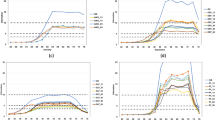Abstract
Purpose
The Patient Reported Outcomes Measurement Information System (PROMIS®) is a US National Institutes of Health initiative that has produced self-report outcome measures, using a framework of physical, mental, and social health defined by the World Health Organization in 1948 (WHO, in Preamble to the Constitution of the World Health Organization as adopted by the International Health Conference, New York, 1948). The World Health Organization’s International Classification of Functioning, Disability and Health (ICF) is a comprehensive classification system of health and health-related domains that was put forward in 2001. The purpose of this report is to compare and contrast PROMIS and ICF conceptual frameworks to support mapping of PROMIS instruments to the ICF classification system .
Methods
We assessed the objectives and the classification schema of the PROMIS and ICF frameworks, followed by content analysis to determine whether PROMIS domain and sub-domain level health concepts can be linked to the ICF classification.
Results
Both PROMIS and ICF are relevant to all individuals, irrespective of the presence of health conditions, person characteristics, or environmental factors in which persons live. PROMIS measures are intended to assess a person’s experiences of his or her health, functional status, and well-being in multiple domains across physical, mental, and social dimensions. The ICF comprehensively describes human functioning from a biological, individual, and social perspective. The ICF supports classification of health and health-related states such as functioning, but is not a specific measure or assessment of health, per se. PROMIS domains and sub-domain concepts can be meaningfully mapped to ICF concepts.
Conclusions
Theoretical and conceptual similarities support the use of PROMIS instruments to operationalize self-reported measurement for many body function, activity and participation ICF concepts, as well as several environmental factor concepts. Differences observed in PROMIS and ICF conceptual frameworks provide a stimulus for future research and development.


Similar content being viewed by others
References
WHO (1948). Preamble to the Constitution of the World Health Organization as adopted by the International Health Conference, New York, 19–22 June 1946, and entered into force on 7 April 1948.
Üstün, B., & Jakob, R. (2005). Calling a spade a spade: Meaningful definitions of health conditions. Bulletin of the World Health Organization, 83, 802.
ICF (2001). International classification of functioning, disability and health. Geneva Switzerland: World Health Organization.
Ustun, T. B., Chatterji, S., Bickenbach, J., Kostanjsek, N., & Schneider, M. (2003). The international classification of functioning, disability and health: A new tool for understanding disability and health. Disability and Rehabilitation, 25(11–12), 565–571.
Cieza, A., Geyh, S., Chatterji, S., Kostanjsek, N., Ustün, B., & Stucki, G. (2005). ICF linking rules: An update based on lessons learned. Journal of Rehabilitation Medicine, 37, 212–218.
Geyh, S., Cieza, A., Kolleris, B., Grimby, G., & Stucki, G. (2007). Content comparison of health-related quality of life measures used in stroke based on the international classification of functioning, disability and health (ICF): A systematic review. Quality of Life Research, 16(5), 833–851.
Riley, W. T., Rothrock, N., Bruce, B., et al. (2010). Patient-reported outcomes measurement information system (PROMIS) domain names and definitions revisions: Further evaluation of content validity in IRT-derived item banks. Quality of Life Research, 19(9), 1311–1321.
Cella, D., Yount, S., Rothrock, N., et al. (2007). The Patient-Reported Outcomes Measurement Information System (PROMIS): progress of an NIH Roadmap cooperative group during its first two years. Medical Care, 45(5 Suppl 1), S3–S11.
McDougall, J., Wright, V., & Rosenbaum, P. (2010). The ICF model of functioning and disability: Incorporating quality of life and human development. Developmental Neurorehabilitation, 13(3), 204–211. doi:10.3109/17518421003620525.
PROMIS® Instrument Development and Psychometric Evaluation Scientific Standards. http://www.nihpromis.org/Documents/PROMIS_Standards_050212.pdf. Accessed 19 Dec 2012.
Carle, A. C., Cella, D., Cai, L., Choi, S. W., Crane, P. K., Curtis, S. M., et al. (2011). Advancing PROMIS’s methodology: Results of the third Patient-Reported Outcomes Measurement Information System (PROMIS(®)) Psychometric Summit. Expert Rev Pharmacoecon Outcomes Res, 11(6), 677-84. doi: 10.1586/erp.11.74.
Oberhauser, C., Escorpizo, R., Boonen, A., Stucki, G., & Cieza, A. (2012). A statistical validation of the Brief ICF Core Set for osteoarthritis based on a large international sample of patients with osteoarthritis. Arthritis Care Res (Hoboken). 2012 Jun 28. doi: 10.1002/acr.21775.
Kus, S., Oberhauser, C., Cieza, A. (2012). Validation of the brief International Classification of Functioning, Disability, and Health (ICF) core set for hand conditions. Journal of Hand Therapy, 25(3), 274–286; quiz 287. doi: 10.1016/j.jht.2012.02.003.
Glocker, C., Kirchberger, I., Glaessel, A., Fincziczki, A., Stucki, G., & Cieza, A. (2012). Content validity of the comprehensive international classification of functioning, disability and health (ICF) core set for low back pain from the perspective of physicians: a Delphi survey. Chronic Illness. [Epub ahead of print] PubMed PMID: 22689356.
Cieza, A., Brockow, T., Ewert, T., et al. (2002). Linking health-status measurements to the international classification of functioning, disability and health. Journal of Rehabilitation Medicine, 34, 205–210.
Ghazvinian, A., Noy, N. F., & Musen, M. A. (2009). Creating mappings for ontologies in biomedicine: Simple methods work. In AMIA annual symposium (AMIA 2009), San Francisco, CA.
Tucker, C.A., Escorpizo, R., Cieza, A., Lai, J. S., Stucki, G., Ustun, T.B., et al. (2013). Describing the Content of the Patient Reported Outcomes Measurement Information System (PROMIS®) Using the International Classification of Functioning, Health and Disability (in review 12/2013).
Author information
Authors and Affiliations
Corresponding author
Rights and permissions
About this article
Cite this article
Tucker, C.A., Cieza, A., Riley, A.W. et al. Concept Analysis of the Patient Reported Outcomes Measurement Information System (PROMIS®) and the International Classification of Functioning, Disability and Health (ICF). Qual Life Res 23, 1677–1686 (2014). https://doi.org/10.1007/s11136-014-0622-y
Accepted:
Published:
Issue Date:
DOI: https://doi.org/10.1007/s11136-014-0622-y




